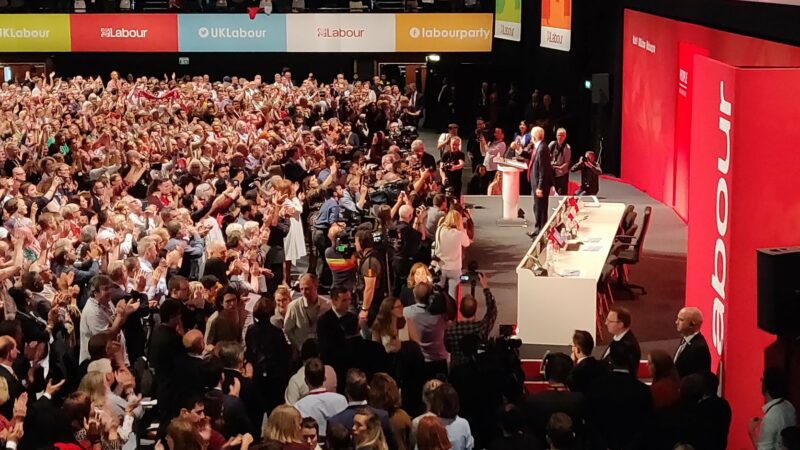
Momentum is set to back a raft of policies at Labour conference this year including public ownership of key sectors of the economy and the repeal of all anti-trade union laws following a vote by its members.
The activist organisation conducted its second annual ‘policy primary’, asking Momentum members to vote on 20 motions proposed by local Momentum groups, affiliates and campaign organisations.
Momentum announced today that it will support five of the motions at conference, including that submitted by Labour for a Green New Deal, which called for a “state-coordinated industrial strategy” to ensure a “rapid, just energy transition” among other policies.
Members also voted in favour of a motion calling for a £15 minimum wage and an end to zero-hour contracts, as well as a motion urging Labour to commit to the introduction of proportional representation (PR) for general elections in the party’s next manifesto.
A Momentum spokesperson said: “Momentum’s members have spoken and their message is clear: Labour must place democracy at the heart of its programme, from public ownership to proportional representation. As a Party, we can replace a rigged Tory economy working only for the few with a system run by and for the many.”
The spokesperson added: “In place of the Labour leadership’s unpopular and untimely retro-Blairite platform, Labour members and trade unions have the opportunity at conference to lay out an election-winning vision for 21st century socialism, with an ambitious programme that meets the dire need felt by so many working-class people.”
LabourList understands that Momentum’s national coordinating group (NCG) is expected to meet next week to discuss which additional policy areas the organisation will campaign for alongside those chosen in the policy primary. Last year, the NCG chose to focus on crime, policing and migration, and it is expected that these issues are likely to be prioritised again.
The five motions Momentum will campaign on ahead of Labour conference, as voted for by members, are:
- For public ownership of energy (includes full public ownership of the energy industry, including the National Grid and regional distribution, and a permanent windfall tax on oil and gas companies, using revenue generated to expand publicly-owned renewables)
- Two linked crises: the cost-of-living crisis and the climate crisis (includes a minimum wage of £15 per hour, an end to zero-hour contracts, investment in green energy and retrofitting homes, creating well-paid, unionised green jobs within publicly-owned entities and control of domestic rent to 30% of local income)
- Advancing workers’ agenda by repealing all anti-trade union laws (includes repealing all anti-union laws and committing to their replacement with a code of labour rights using the proposals set out in Labour’s 2017 and 2019 manifestos)
- Proportional representation (includes Labour making a commitment to introduce PR for general elections in the next manifesto and to changing the voting system for general elections to a form of PR in the first term of the next Labour government)
- Labour for a Green New Deal (includes supporting a state-coordinated industrial strategy, introducing democratic public-ownership models across the economy, led by national public ownership of key sectors, and promoting public-municipal enterprises, worker-ownership and democratic control of firms including buses, retrofitting and construction)
Momentum’s first policy primary ahead of the 2021 Labour conference also saw members back a £15 minimum wage and a change in the Westminster voting system to PR, as well as a four-day working week.
Conference delegates last year voted in favour of the motion urging the party to raise the minimum wage to £15 per hour. The leadership has committed to raising the legal minimum to £10 per hour.
Writing for LabourList, John McDonnell MP urged the organisation’s members to “finish what we started in Brighton” and support a motion calling for the Labour Party to back PR for general elections.
The motion was rejected at last year’s conference – despite 79.51% of Constituency Labour Party delegates supporting the policy – as trade union delegates voted against. McDonnell argued that unions did not have the chance to hear motions on electoral reform ahead of conference due to Covid.
“Since then, debate has moved on within large parts of the trade union movement – including Unite, which came out firmly against the first-past-the-post system at its policy conference last autumn, a move welcomed by Sharon Graham. Other unions will discuss electoral reform in the coming weeks and months,” McDonnell wrote.




More from LabourList
Economic stability for an uncertain world: Spring Statement 2026
‘Biggest investment programme in our history’: Welsh Labour commit to NHS revamp if successful in Senedd elections
James Frith and Sharon Hodgson promoted as government ministers